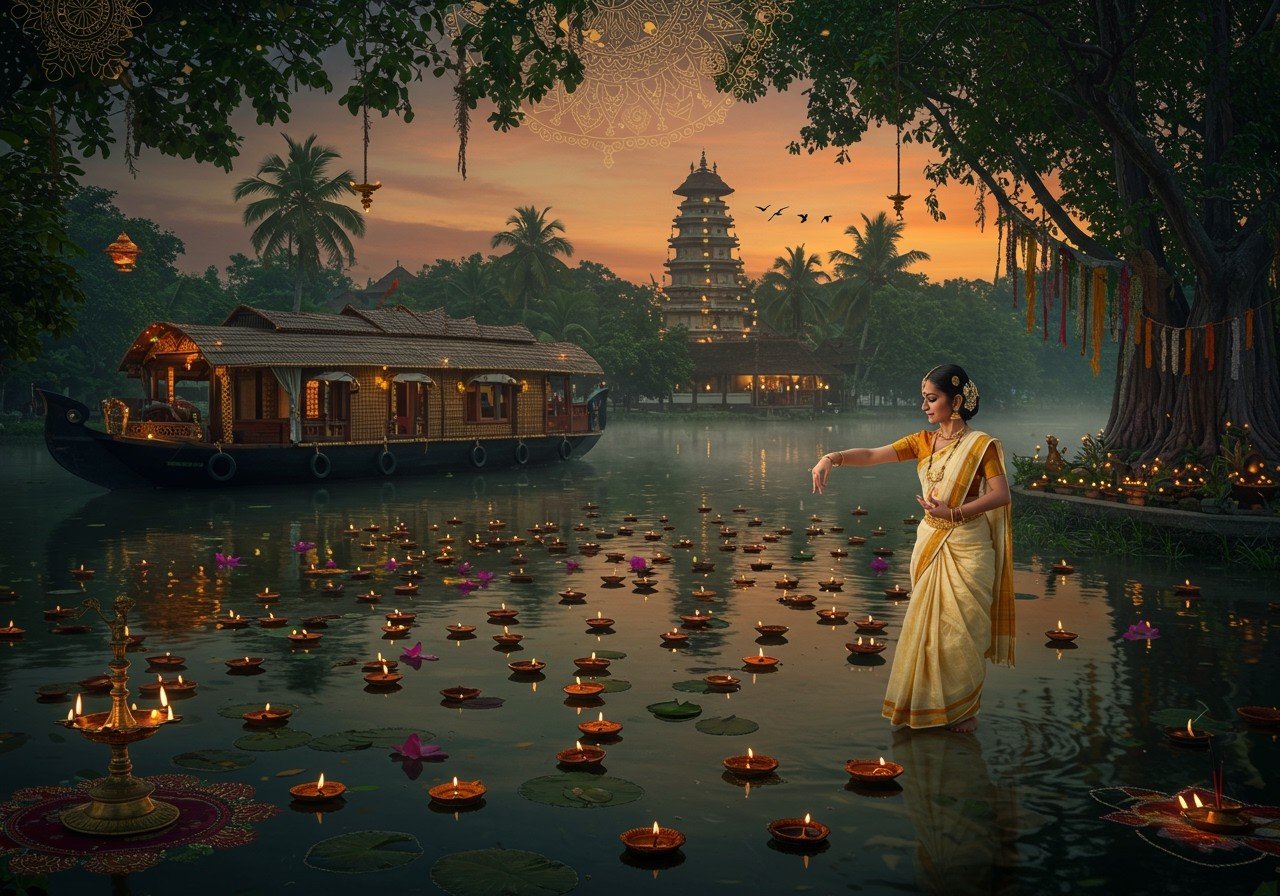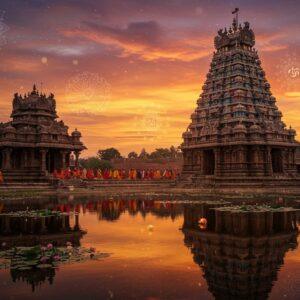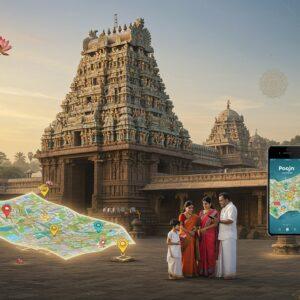
Kerala, often called “God’s Own Country,” is a haven for spiritual travelers. Renowned for its lush landscapes, tranquil backwaters, and rich cultural heritage, Kerala offers a unique blend of spirituality and natural beauty. This guide provides essential tips for navigating Kerala, ensuring a fully immersive experience in the region’s serene and sacred atmosphere.
Best Time to Visit Kerala
Planning a trip to Kerala involves choosing the right time. Winter (October to March) offers pleasant weather, ideal for exploring temples, ashrams, and spiritual sites.
Festivals:
- Onam (August-September): Celebrates the harvest season with traditional rituals, vibrant celebrations, and cultural performances.
- Vishu (April): The New Year festival, known for auspicious rituals, vibrant festivities, and the Vishukkani, a symbolic arrangement of auspicious items.
- Thrissur Pooram (April/May): Famous for its grand elephant procession, fireworks displays, and traditional percussion performances.
Monsoon Season (June-September):
Experience unique Ayurvedic treatments and the rejuvenating power of nature during Kerala’s monsoon season.
Summer Season (April-May):
Enjoy quieter experiences and discounted rates, ideal for peaceful spiritual retreats without the crowds.
Booking Tips:
- Book accommodations and transportation in advance, especially during peak seasons and festivals.
- Check local event calendars for spiritual gatherings, ceremonies, and festivals to enhance your experience.
- Explore seasonal local produce, particularly those relevant to traditional Ayurvedic diets and practices.
Transportation in Kerala
Kerala boasts a well-connected transportation network.
Travel Options:
- KSRTC Buses: Convenient and affordable, offering a cultural experience.
- Scenic Train Journeys: Especially routes through the Western Ghats, offering breathtaking views.
- Private Taxis/Car Rentals: For personalized itineraries and flexibility.
- Houseboats: A unique spiritual retreat in the backwaters of Alleppey and Kumarakom.
- Auto-Rickshaws: Affordable for short distances within cities and towns.
- Domestic Flights: Connecting major cities like Kochi, Thiruvananthapuram, and Kozhikode.
Accommodation in Kerala
Kerala offers a range of accommodations.
Options:
- Heritage Hotels: Experience Kerala’s rich cultural background and traditional hospitality.
- Ashrams & Retreat Centers: Immerse yourself in spiritual practices and teachings.
- Resorts & Hotels: Choose from luxury resorts to budget-friendly options.
- Homestays: Experience local culture and hospitality.
Exploring Spiritual Sites in Kerala
Kerala, often called “God’s Own Country,” is a treasure trove of spiritual experiences. From ancient temples to serene ashrams, Kerala invites you to explore its rich spiritual heritage.
Prominent Temples:
- Aranmula Parthasarathy Temple: Dedicated to Lord Krishna, this temple is known for its unique rituals and the annual Valla Sadhya boat race.
- Sabarimala: Nestled in the Western Ghats, this temple is dedicated to Lord Ayyappa and is one of the most famous pilgrimage sites in India.
- Guruvayur Temple: Known as the Dwarka of South India, this temple is dedicated to Lord Krishna.
- Padmanabhaswamy Temple: Located in Thiruvananthapuram, this temple is renowned for its intricate architecture and rich history.
Famous Ashrams:
- Amritapuri Ashram: Founded by Mata Amritanandamayi Devi (Amma), this ashram is a sanctuary for meditation and self-discovery.
- Sivananda Ashram: Situated in Neyyar Dam, this ashram offers yoga and meditation programs.
Lesser-Known Temples:
- Attukal Bhagavathy Temple: Known for the Attukal Pongala festival, where millions of women gather to cook offerings.
- Thirumandhamkunnu Temple: A serene temple dedicated to Lord Shiva, known for its peaceful atmosphere and annual festivals.
- Thirnelli Temple: Situated amidst lush forests, this ancient temple is associated with Lord Vishnu.
- Chottanikkara Temple: Known for its healing powers, this temple is dedicated to Goddess Bhagavathy.
Rituals and Practices
Kerala’s spiritual practices are deeply rooted in tradition.
Dress Code:
Dress modestly when visiting temples. Men typically wear dhotis, while women wear sarees or salwar kameez.
Offerings:
Devotees bring flowers, fruits, and coconuts as offerings. Participating in rituals like arati and bhajan enhances the spiritual experience.
Spiritual Diversity
Kerala’s spiritual landscape is diverse, reflecting its rich cultural heritage. The state is home to ancient temples, historic mosques like the Cheraman Juma Masjid, and vibrant rituals such as Theyyam and Padayani. Kerala also has significant Christian and Jewish legacies. Spiritual tourism packages are available, offering journeys to various religious sites over 5-7 days.
Churches:
Kerala has a significant Christian population, with numerous churches serving as important pilgrimage sites, such as St. George’s Forane Church and Parumala Church.
Mosques:
Historic mosques like the Cheraman Juma Masjid, believed to be the oldest in India, showcase Kerala’s Islamic heritage and centuries of religious harmony.
Synagogues:
The Paradesi Synagogue in Kochi stands as a testament to Kerala’s Jewish legacy and its multicultural spirit.
Festivals and Ceremonies
Participating in local festivals offers a deeper spiritual engagement.
Onam (August-September):
Kerala’s harvest festival, Onam, includes traditional rituals, boat races, floral decorations (pookalam), and elaborate feasts (Onasadya).
Vishu (April):
The New Year festival, Vishu, marks new beginnings with auspicious rituals, the Vishukkani (first sight of auspicious items), and traditional games.
Thrissur Pooram (April/May):
This grand festival features impressive elephant processions, vibrant percussion performances (chenda melam), and spectacular fireworks displays.
Guided Tours
Consider joining guided tours led by local experts for deeper insights into rituals, history, and cultural significance, enriching your spiritual journey.
Practical Tips for Spiritual Travelers
Respect Local Customs:
Be mindful of local traditions and customs, especially in religious sites.
Appropriate Attire:
Dress modestly to show respect in temples and spiritual centers.
Safety and Health:
Take necessary health precautions, stay hydrated, and carry essential items like meditation cushions and prayer beads.
Flexible Itinerary:
Allow for flexibility in your itinerary to accommodate spontaneous spiritual experiences.
Managing Finances:
Plan your finances effectively. Currency exchange services are available in major cities.
How Poojn.in Supports Your Kerala Spiritual Journey
Poojn.in, India’s largest cultural goods and services store, offers essential puja items and religious supplies delivered right to your location, supporting your spiritual journey in Kerala. Our online store features:
- Traditional Kerala Puja Items: Access authentic Nilathodu (നിലത്തോടു) and other regional items used in Kerala temples and rituals.
- Complete Puja Kits: Pre-assembled sets containing all necessary items for specific Kerala rituals and ceremonies.
- Holy Utensils: Traditional Kerala-style vessels and implements made from prescribed materials like copper and brass.
- Pooja Samagri: A full range of ritual ingredients and materials commonly used in Kerala temples and homes, including incense sticks, camphor, and essential oils.
Visit Poojn.in to browse our collection or contact customer service for guidance on Kerala-specific ritual requirements. We ensure genuine products with secure packaging and reliable delivery across India.
Embrace the Spiritual Journey
Kerala offers a unique blend of spirituality, culture, and natural beauty. As you explore its sacred sites and immerse yourself in local traditions, you’ll find a deeper connection with yourself. Remember to respect customs, dress appropriately, and keep an open heart and mind. Let the spiritual energy of Kerala guide you, bringing peace, joy, and enlightenment to your life.
Frequently Asked Questions
What is the best time to visit Kerala for a spiritual journey?
The best time is during the winter months, from October to March, for pleasant weather ideal for temple visits.
How can I get around Kerala?
Kerala offers diverse transport options like KSRTC buses, trains, taxis, auto-rickshaws, and even houseboats for a unique backwater experience.
What kind of spiritual sites can I visit in Kerala?
Kerala is home to renowned temples like Sabarimala, Guruvayur, and Padmanabhaswamy Temple, along with serene ashrams such as Amritapuri and Sivananda Ashram. You can also explore historic mosques, churches, and synagogues, reflecting Kerala’s rich spiritual diversity.
Is it safe to travel alone in Kerala?
Kerala is generally safe for solo travelers, but it’s always wise to take standard precautions and be aware of your surroundings.
What should I wear when visiting temples in Kerala?
Dress modestly when visiting temples. Men traditionally wear dhotis, and women wear sarees or salwar kameez. Avoid wearing shorts, sleeveless tops, or revealing clothing.


